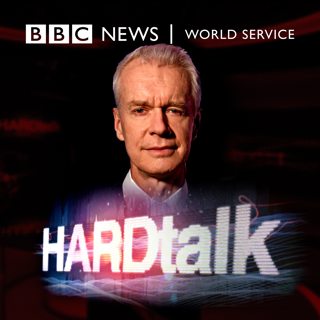
James Robinson - Professor of Government, Harvard University
Stephen Sackur speaks to the renowned Harvard academic James Robinson. In a recent book, written together with Daron Acemoglu, he tries to answer one of the most basic questions of global economics and politics: why do some nations thrive while others fail? What does Norway have that Mali lacks? There are of course multiple answers based on physical geography, resources and cultural differences, but James Robinson is adamant one factor determines economic success much more than all others: the development of resilient, inclusive political institutions. Put crudely, the idea is political freedom begets prosperity - but is that always true?(Image: James Robinson)
18 Heinä 201223min

Dame Jocelyn Bell Burnell - Astrophysicist
Stephen Sackur speaks to a scientist of rare distinction. Jocelyn Bell Burnell was a key member of the team which discovered pulsars and neutron stars in the late 1960s. She became one of the world’s most renowned astrophysicists - remarkable for the originality of her research, but also for being one of the few prominent women in her discipline. Throughout her career she's blazed a trail for women in a predominantly male world. Why are there so few women at science's top table?Image: Jocelyn Bell Burnell
15 Heinä 201223min

Paul Kagame - President of Rwanda
Is Rwanda's president Paul Kagame in serious danger of losing the international community's goodwill?He has been accused of autocratic behaviour and of being unrealistic about the prospects for an economic transformation of Rwanda, a country still haunted by the ghosts of genocide.Perhaps most damagingly, a recent UN report claimed that the Rwandan government is breaking UN sanctions by backing rebels in the neighbouring Democratic Republic of Congo.Zeinab Badawi talks to President Paul Kagame: can he reclaim his reputation as a bold and visionary leader or is he destined to go down as another African strongman who failed to live up to expectations?(Image: Rwandan President Paul Kagame in 2010. Credit: AP Photo / Adam Scotti)
12 Heinä 201223min

Karel De Gucht - European Commissioner for Trade
Stephen Sackur talks to a member of the Brussels political elite, the EU Trade Commissioner Karel de Gucht. His job is to promote Europe's trade agenda around the world - but who is listening when the EU itself is staring over an economic abyss?Europe's politicians resemble the cast of a third rate disaster movie... trapped in a Eurozone crisis from which there is no obvious means of escape. Can the continent's leaders stay calm or will rising panic consume them?(Image: Karel de Gucht giving a press conference in February 2012 Credit: AFP / Getty Images)
11 Heinä 201223min

Femi Kuti - Musician and Activist
Zeinab Badawi talks to the musician and political activist Femi Kuti, son of the late, legendary afrobeat pioneer Fela Kuti. As Africa's most populous nation and one of its biggest oil producers, Nigeria is a giant on the African stage. But in terms of prosperity it has never fulfilled the expectations of its people.Femi Kuti is a constant thorn in the side of the Nigerian authorities and uses his songs to criticise government and speak up on behalf of the poor and dispossessed. But with fantastic rates of growth in Nigeria and elsewhere in Africa, is Femi Kuti being overly pessimistic about Nigeria's prospects?(Image: Femi Kuti performs on the stage in 2008. Credit: Stephane de Sakutin / AFP / Getty Images)
9 Heinä 201223min

Ghazi Hamad – Hamas Deputy Foreign Minister
The election of a Muslim Brotherhood candidate Mohammed Morsi as president of Egypt will have an impact not only on Egypt but also elsewhere in the Middle East. Nowhere more so perhaps than in Gaza. There, Hamas, which is the Palestinian branch of the Muslim Brotherhood, has ruled for five years. Zeinab Badawi speaks to Ghazi Hamad, deputy foreign minister for Hamas in Gaza. At loggerheads with the Palestinian Authority on the West Bank and viewed by Israel as a terrorist organisation, will the new dynamics of power in Egypt better serve the cause of peace and reconciliation in the Middle East or merely exacerbate the tensions?
6 Heinä 201223min

Professor Niall Ferguson - Historian
The British Government has promised action to deal with the scandal at Barclays. The bank has been fined for trying to fix the interest rate at which banks lend to each other - London Interbank Offered Rate - or Libor. Yet again it's the lack of regulation that is being blamed for a financial problem. Sarah Montague talks to Professor Niall Ferguson who argues that the world is responding in the wrong way to the global financial crisis. He thinks the economic chaos which began in 2007 was caused by too much regulation, not too little.(Image: Professor Niall Ferguson)
3 Heinä 201223min

Lynton Crosby - Political Strategist
Electoral politics is a blood sport and some of the toughest fighters in the game are the campaign strategists who hone and sell their candidates' message.Lynton Crosby is widely regarded as a master in the dark arts of political campaigning. He ran winning election campaigns in his native Australia for former prime minister John Howard. In the UK, he twice helped Boris Johnson win the London Mayor's office. Opponents on the left have accused him of using grubby, divisive methods to further a conservative agenda. Is bare-knuckle politics good for democracy?(Image: Lynton Crosby)
1 Heinä 201223min






















